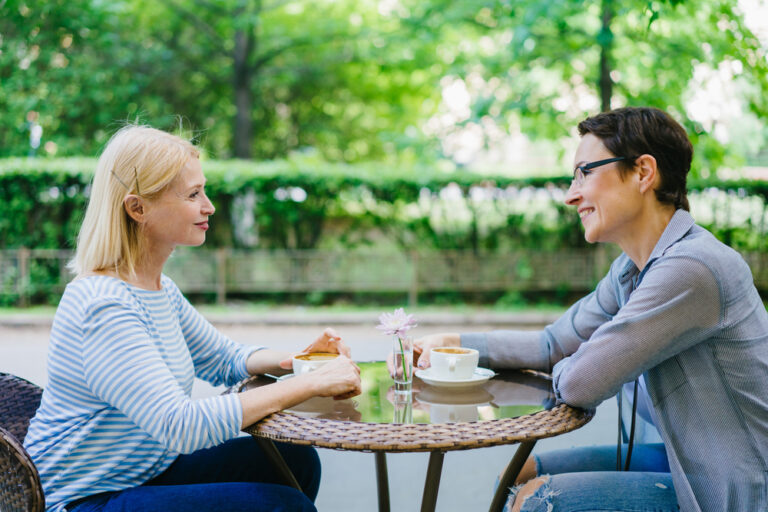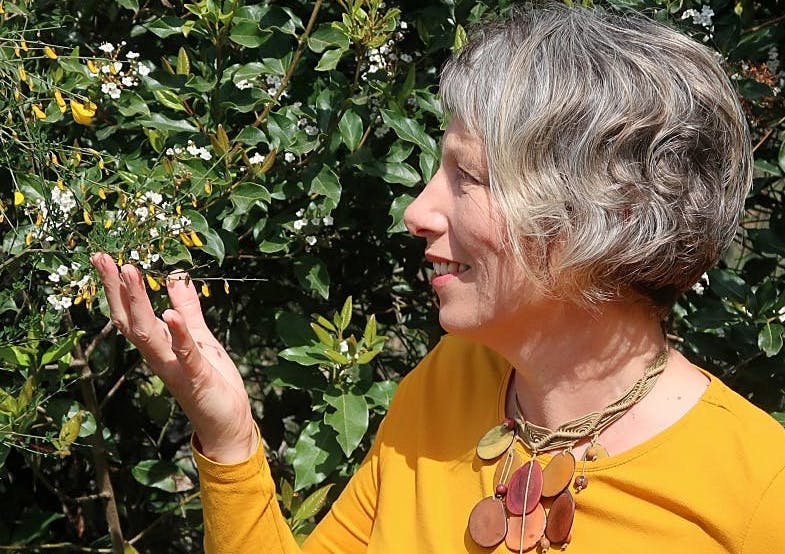Why Is It So Important To Connect With Other People?

There are many benefits to connecting with others, including improvements to our physical, mental and emotional well-being.
Humans are social creatures and we depend on each other to thrive. Way back when we were hunter-gatherers, we simply wouldn’t have survived for very long without the support of other people. Thousands of years later, we still need each other.
More than we might realise. The power of human connection is remarkable.
So why do we so often feel isolated and unable to ask for help?
For decades, I proudly owned the label ‘fiercely independent’. I didn’t realise at the time but this is a classic coping strategy for not feeling loved, wanted or ‘good enough’ as a child. It’s only since I started doing personal development work that I realise what a mistake it was to avoid connecting with others and seeking support.
I also grew up in Thatcher’s Britain, when the prevailing ideology was ‘look out for number one, at the expense of all others’. Being an introvert didn’t help, nor did being a woman, come to think of it.
I thought I had to stand on my own two feet and do everything on my own. That asking for help was a sign of weakness or an imposition. No one else was going to take care of me and nor should I expect them to. I didn’t want to be a burden or feel obligated to anyone if they did me a favour.
In recent years, I’ve come to understand how unhelpful these deeply ingrained beliefs have been. And how many people share them. I am not alone in finding it difficult to connect with people sometimes.
The pandemic certainly hasn’t helped matters. Yes, in some ways, we have more access to networks and people than ever before, with an increasing number of communities going online. I know I’ve certainly benefited from this.
Yet too much Zoom time is draining and if you’re doing it for work, it’s hard to find the energy to connect with friends and family.
So why bother?
What are the health benefits of connecting with others?
1. Social connections help you live longer
For a start, you’re less likely to contract or die from a serious illness if you’ve got social support. Research that incorporated data from 308,849 participants showed that regardless of age, sex, health status and other factors, those with stronger social relationships were 50% more likely to survive a medical issue than those without.
The results suggest that a lack of social connections is as important a risk factor as things like smoking and alcohol consumption and are even more significant than obesity and physical inactivity.
You’re also less likely to want to kill yourself if you’ve got someone to talk to.
2. You’ll get a sense of belonging
Aside from not dying just yet, there are other incentives for connecting with other people.
If you have a stable, loving family, you might already appreciate what it’s like to feel part of a caring, supportive group. For many people, for many reasons, families are frequently a source of discord and stress, rather than comfort.
Whatever your family background, finding a group of people who share your interests and values means that you have people in your life who ‘get you’. They understand your struggles and successes and can help you celebrate the little wins as well as offer advice and practical support when you need it.
I’m a member of several online groups, full of people I would not have had the opportunity to meet in real life because I live in rural Portugal.
I’ve created my own Facebook group, Midlife Women Connecting For Wellbeing, so please join us there.
I’m also in several Facebook groups related to blogging, business and creativity. I know that if I ask for help in these communities, I will be taken seriously, treated with respect and supported by the other members. That matters.
You can say what you like about Facebook, and I have my own reservations about the platform, but these groups have been a lifeline, especially during the pandemic.

3. Your levels of confidence improve via social connections
Even if, like me, you’re introverted and a bit awkward in social settings, once you’ve established friendships or supportive relationships with a few key people who you can trust, your sense of self-worth improves.
These people not only support you through tough times, they also inspire and motivate you to try new things, to have fun and to be unapologetically yourself.
Being able to drop the mask we often feel obliged to wear in public and to be vulnerable and open with people you trust is a risk worth taking. None of us is perfect and you’ll find you’re not alone in your fears, perceived failings and anxieties. Knowing that can boost your self-esteem.
4. You’ll achieve greater things
Sharing your intentions or goals with other people can be a great way of getting things done. If you’re a world class procrastinator like me, ask someone in your network to hold you accountable for actions you need to take.
These could be work-related, fitness goals or anything really, e.g. clearing out a drawer that’s crammed full of junk. The act of telling someone else you’re going to do the thing means that pyschologically, you are not only letting yourself down if you don’t do it, you risk someone else being disappointed in you.
Why not team up with someone for a workout, even if you’re both doing them in your own homes? You can check in at the start and end and congratulate each other on your success.
You can also do this if you’re working from home and want some virtual company to motivate you. Arrange with someone to set aside a specific time to work on your own projects.
Check in with each other before you get started, set a timer then leave Zoom or Skype running on mute while you get on with your work without distractions. When the time’s up, check in again and share how much you got done.
You don’t have to actually spend time with people to feel a sense of connection
This is wonderful news for introverts or people who suffer from social anxiety, as well as those who are currently more isolated than usual due to the extraordinary times we are living through.
You can actually get the physiological and psychological benefits of connecting with others by thinking about them and wishing them well.
I discovered the practice of loving-kindness while studying Positive Psychology and it has transformed the way I think about and interact with other people.
You’ll find more detail on loving-kindness meditation in this article but essentially, you send kind and loving wishes to someone silently, from within.
It’s easiest to start with someone you already have fond feelings for, or a pet!
Picture this person or animal in your mind’s eye and notice any warm feelings you experience. Then silently repeat phrases to send them good wishes. You can change the wording but these are good starting points:
May you feel safe.
May you feel happy.
May you feel healthy.
May you live with ease.
You can extend this loving-kindness to other people, including yourself and people you don’t know very well. Even people you find challenging!
The good news is that the more you practice this, the easier and more natural it becomes and you can do it with people you encounter in your daily life.
Next time you go to the supermarket, make eye contact and smile at the cashier. You can silently send them loving-kindness or, to make their day even better, thank them in a way that makes them feel valued.
You’ll be sharing the benefits of connecting with others and brightening their day.



